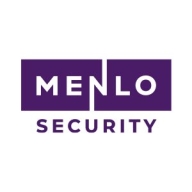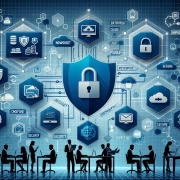


Menlo Secure and Check Point Harmony SASE are leading security service providers. Users indicate that Check Point Harmony SASE has the upper hand due to its extensive features and excellent customer service, despite better pricing and support from Menlo Secure.
Features: Menlo Secure offers robust web security, effective isolation policies, and competitive pricing. Check Point Harmony SASE is favored for its comprehensive integration capabilities, zero-trust access, and enhanced features suited to a broad tech ecosystem.
Room for Improvement: Menlo Secure needs better customization, improved alert management, and enhanced reporting features. Check Point Harmony SASE could benefit from streamlined reporting, better mobile support, and more intuitive user interfaces.
Ease of Deployment and Customer Service: Menlo Secure is noted for its straightforward deployment but mixed customer service responsiveness. Check Point Harmony SASE is highly rated for both deployment and customer support, with users highlighting prompt and effective assistance.
Pricing and ROI: Menlo Secure has competitive setup costs and a good ROI in terms of security performance and operational efficiency. Check Point Harmony SASE has a higher setup cost, but users feel the ROI justifies it given its enhanced features and comprehensive services.
| Product | Market Share (%) |
|---|---|
| Fortinet FortiGate | 6.2% |
| Check Point Harmony SASE (formerly Perimeter 81) | 2.5% |
| Menlo Secure | 1.6% |
| Other | 89.7% |


| Company Size | Count |
|---|---|
| Small Business | 357 |
| Midsize Enterprise | 132 |
| Large Enterprise | 188 |
| Company Size | Count |
|---|---|
| Small Business | 52 |
| Midsize Enterprise | 19 |
| Large Enterprise | 14 |
Fortinet FortiGate is a versatile network security tool offering features like VPN, firewall, web filtering, intrusion prevention, and scalability. It is known for its performance and integration with other Fortinet products, making it a preferred choice for robust cybersecurity.
Fortinet FortiGate stands out as a comprehensive cybersecurity solution with strong performance and ease of configuration. It delivers unified threat management, integrating features such as dynamic routing, SD-WAN support, and centralized management. Despite its strengths, improvements in the web interface's stability, pricing structures, and reporting capabilities are needed. Users seek better integration with third-party tools and automation advancements to enhance the experience further. These enhancements, alongside improvements in bandwidth management and the reduction of licensing costs, are points of interest for users looking to capitalize on FortiGate's extensive capabilities.
What are Fortinet FortiGate's key features?Fortinet FortiGate is widely implemented across industries as a primary firewall system for securing internet gateways and safeguarding data centers. It supports businesses in achieving SD-WAN integration and enhances cybersecurity by providing essential features like antivirus, web filtering, and application control. Enterprises utilize FortiGate for securing remote connections and ensuring compliance with security standards, making it adaptable for different network sizes and industries.
Check Point Harmony SASE, formerly Perimeter 81, offers robust security features like split tunneling, MFA, and Zero Trust Network Access focused on secure remote access and optimized connectivity for remote teams.
Check Point Harmony SASE delivers advanced security through a user-friendly interface, efficient VPN connections, and a centralized management console. It enhances security with real-time threat intelligence from ThreatCloud and traffic management via built-in optimization. Firewall as a Service and Secure Web Gateway safeguard against unauthorized access and phishing. While users seek enhanced networking customizations and better integration with identity providers, there's an emphasis on improving reporting, real-time analytics, and policy management. Requests also include a Chrome extension, traffic balancing, and simplified configuration to address some resource-intensive aspects.
What are the key features of Check Point Harmony SASE?
How can organizations benefit from using Check Point Harmony SASE?
Check Point Harmony SASE is used across industries for secure remote access and connectivity, protecting sensitive data, and managing access to corporate resources. It is ideal for those with hybrid cloud models and requires comprehensive security measures combined with existing IT infrastructures to meet specific industry demands.
Menlo Security Secure Application Access
Menlo Security Secure Application Access makes zero trust access easy, giving users secure connectivity to private applications, including web and legacy applications. At the core of Secure Application Access is the Menlo Secure Cloud Browser, which fetches, secures and delivers the content for users.
In addition to providing simple-to-deploy, clientless ZTA, Secure Application Access and the Menlo Secure Cloud Browser protect applications from attacks such as session hijacking, cookie manipulation, and other tactics that employ protocol manipulation.
Secure Application Access protects applications from Internet threats and provides granular controls for added protection of the application and associated data. These security controls include Read-only/Read-write, Upload/download, Copy/paste, AV scanning, Sandboxing, and Data Loss Prevention.
Last Mile Data Protection
Menlo Last-Mile Data Protection identifies and prevents sensitive data from leaving your company by meticulously inspecting all file uploads and user input across browsing sessions. Leveraging the Secure Cloud Browser, users are protected from the internet and you can protect your organization from data loss with comprehensive traffic monitoring and controls. This approach addresses the growing concerns surrounding data leakage in the age of AI tools like ChatGPT.
By identifying sensitive data through file types, regular expressions, or predefined libraries, Menlo Last-Mile Data Protection empowers security teams to regulate data input into AI platforms and prevent unauthorized uploads. This capability provides crucial protection for intellectual property, PII, and other confidential information.
The solution leverages the Menlo Cloud Security Platform's visibility and control over traffic to reliably detect and prevent data leaks originating from both browser submission forms and non-browser traffic. With the ability to inspect encrypted web traffic, Menlo Last-Mile Data Protection enforces DLP policies consistently across all users and devices, ensuring comprehensive data protection.
We monitor all Secure Web Gateways (SWG) reviews to prevent fraudulent reviews and keep review quality high. We do not post reviews by company employees or direct competitors. We validate each review for authenticity via cross-reference with LinkedIn, and personal follow-up with the reviewer when necessary.